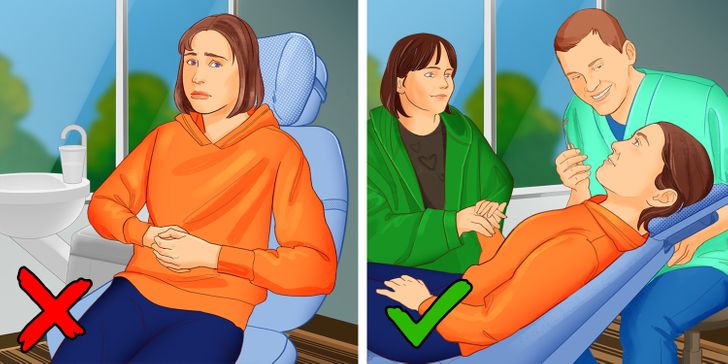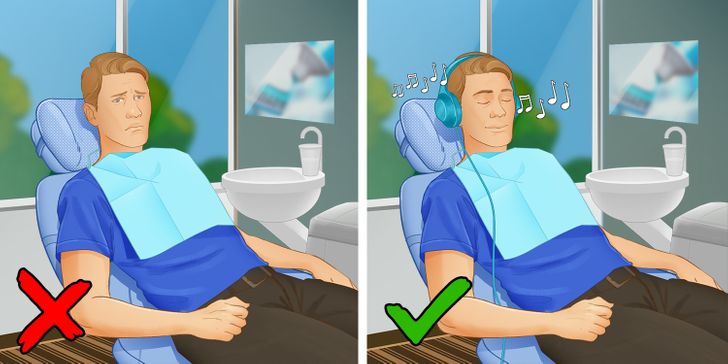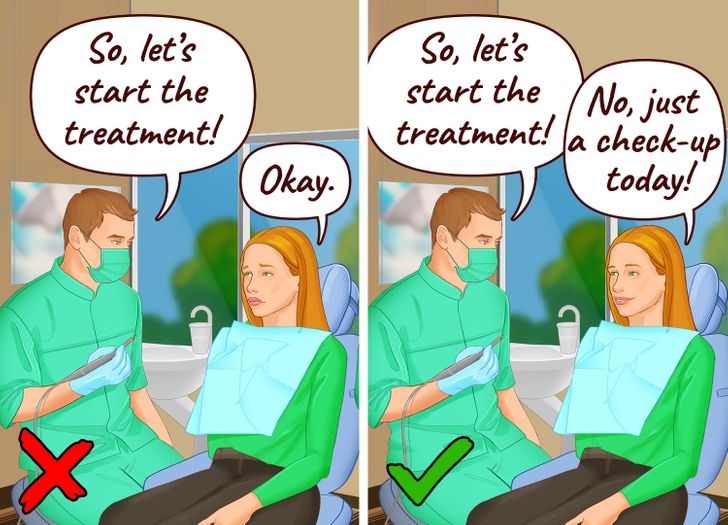What to Do If You’re Scared of Treating Your Teeth
Getting your teeth treated is not a very pleasant process. It’s often associated with pain and negative emotions, from light anxiety to serious fear. The latter appears because you can’t control the situation — the patient is in the chair with their mouth open, and they can’t talk or see what’s going on. And there’s a dentist right there whose actions may cause pain at any moment. So it’s not all that strange for a patient to try to delay the treatment for as long as possible.
5-Minute Crafts decided to find out what to do if you’re scared of getting your teeth treated and collected 7 recommendations to help you overcome the anxiety of visiting the dentist.
❗This article has some general recommendations. If you have some serious anxiety often and you don’t think you can handle it yourself, see a specialist.
1. Find a good dentist.
Try to find a doctor that specializes in treating anxious patients. Ask your relatives, friends, and acquaintances for recommendations.
Additionally, try looking for a dentist online. Use specialized services for your search. Filter the candidates by rating and reading the reviews about them. Check if the patients mention that they were comfortable with the doctor.
2. Ask a friend or relative to come with you.

Go to the first dentist appointment with someone you trust, like a friend or a relative. It should be a person that is not afraid of dentists and can calm you down. If necessary, ask them to sit with you during the appointment.
3. Honestly tell the doctor about your fears.
At the beginning of the appointment, tell the dentist about your fear. Explain in detail what you are scared of and why. Talk about all of your fears and worries, ask any questions about the treatment, any painkillers, and even the tools they are going to use.
In addition, discuss a signal you’d like to make if you feel pain or discomfort. For example, you can wave your hand or raise your index finger. It will tell the dentist to stop.
4. Get distracted.

If there’s a TV in the office, ask the doctor to turn it on. Find an interesting film or a show and focus your attention on it. If there’s no TV, you can listen to a podcast, your favorite music, or a book. Just put on some headphones and listen to something you really like.
5. Try relaxation techniques.
If you feel that you’re too nervous, try taking a deep breath, holding that breath, and exhaling really slowly. Do it several times. It will slow down the heartbeat, relax the muscles, and help you calm down.
Progressive muscle relaxation might also help you. It’s where you flex and relax different muscle groups in turns. To do this, do the following:
- Close your eyes and take 5 slow breaths.
- Focus the attention on the face. Flex the forehead, eyes, jaw, and lips for 5 seconds, then relax them. Remain in a relaxed state for about 15 seconds. Then go to the next muscle group.
- Focus on the neck. Flex it for 5 seconds and then relax it. Remain in a relaxed state for about 15 seconds.
- Do the same with the shoulders, forehead, wrists, back, chest, belly, pelvis area, hips, ankles, and feet.
6. Let yourself leave.

Think about your first visit to the doctor as a simple appointment without any treatment. During the first minutes, tell them you’re just there for a consultation. After that, tell yourself that you are fully safe and there will be no painful procedures — it’s only a check-up. And if the doctor finds cavities and some other problems, the treatment will be scheduled for a different day.
If the fear doesn’t go away during the next appointment, start with simple procedures, like, for example, a professional mouth cleaning. When you build more trust in your dentist, you can start the treatment. Start with simple cavities and gradually move to the teeth that require more complex treatment.
7. Take care of your teeth.
Follow the basic mouth hygiene rules that can prevent the appearance and development of teeth and gum problems. Then you will need fewer treatments. Follow these 5 simple rules:
- Brush your teeth at least twice a day with fluoride-containing toothpaste.
- Regularly floss the spaces between your teeth.
- Eat and drink fewer foods and drinks with lots of sugar.
- Eat more fruits and vegetables.
- Visit a dentist regularly. Professional cleaning and check-ups will help prevent problems or find them at an early stage.
Are there any other ways to be less scared of dentists?